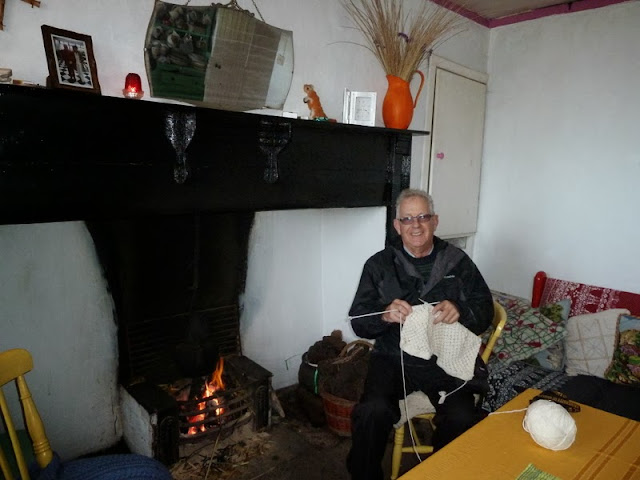We traveled to Inisheer, the
smallest of the three Aran Islands. It involved taking a 9 1/2 minute flight in a 10 seater plane (including the pilot) from the Connemara Airport.

We had to weigh not only our backpacks (we only took an overnight bag) but ourselves. Then we were assigned a specific seat on the plane to balance the load.
Before we got on the plane, we watched the safety video on the TV in the little airport terminal building.

It was quite cozy in the plane.

It was a surprisingly smooth flight in spite of the steady wind. We had a great view as we approached the island (population 250). See our little landing strip?


We could see many stone fences enclosing small tracts of land.

Once on the ground, we were met by our 'wanderly wagon'. Basically it was a wooden hut with plexiglass windows all around pulled by a little Czech tractor, a Zetor.
Here's a look in the door.
We were taken on a little tour of the island. Our first stop was the shipwreck,
The Plassy, that washed up on shore in the 1960s.

We then toured the graveyard and the 10th century Church of
Saint Caomhan, the patron saint of Inisheer. It was almost covered by sand but now the islanders keep it clear and celebrate the the feast day of their patron saint every June 14.

Back on the road, we got a good look at the fences that were everywhere. They are just rocks that are piled up about 4 - 5 feet high.

When people wanted some arable land on the limestone island, they had to break up the stone and pile it up. To get soil, they'd drag sand and seaweed up from the beach.
We were then dropped off at our clean, comfortable bed and breakfast.

Our room was very comfortable with a double bed and a twin bed.

We intended to each take a bed but when we learned that the double bed had an electric blanket on it, we decided to tough it out and cram ourselves into it.
The temperature was actually quite balmy on the island but the wind was so strong we were glad we had worn long underwear (tops and bottoms). The people on our tour from the southern US were frozen most of their time on the island.
After dinner at the community centre and a good night's sleep and Irish breakfast at the B & B, we headed back to the community centre for our traditional Aran knitting session with Una McDonagh.
Our task was to cast on 68 stitches and begin knitting this coffee press cover which incorporated the 'snail's trail', 'honeycomb stitch', 'diamond with double moss stitch and bobble'.
It was a very ambitious task. My suggestion would be to have students knit manageable swatches of each pattern or a smaller piece incorporating the traditional stitches. The instructions we were given were written out row by row. I much prefer knitting from a chart when doing any kind of pattern work. I charted it out when I got home and it was MUCH easier to read.
Our knitting area became a dining area with Una and her husband doing most of the food preparation for us.

Even the non-knitters on our tour got in on making the St. Brigid's cross out of reed after lunch.
Mairead Sharry, a local fibre artist, was our instructor for this 'make and take' workshop.

One of the more commonly told stories of St. Brigid was when she went to
the King of Leinster to ask for land to build a convent. The king was reluctant to give her any land but she bargained with him asking, “will you give me as much land as my cloak
will cover?” The king thought that she was joking and because Brigid’s
cloak was so small he knew that it would only cover a very small piece
of land. The king agreed and Brigid spread her cloak on the ground. She
asked her four friends to hold a corner of the cloak and walk in
opposite directions. The four friends walked north, south, east and
west. The cloak grew immediately and began to cover many acres of land.
The king was astonished and he realised that she had been blessed by
God. The king fell to the ground and knelt before Brigid and promised
her and her friends money, food and supplies. Soon afterwards, the king
became a Christian and also started to help the poor and commissioned
the construction of the convent. Legend has it, the convent was known
for making jam from the local blueberries which was sought for all over
Ireland. There is a new tradition beginning among followers of St.
Brigit to eat jam on 1 February in honour of this miracle.
St. Brigid's cross has the four points, reminiscent of the four directions her cloak stretched.

Skip was pretty proud of the one he made.

The sun came out at one point so I got a couple of shots of buildings on the island.
Here, I'm on the second floor of a building looking over towards the ferry.
At one point we were taken to Mairead's house and studio. Skip hammed it up by posing for this photo.
He sure looked like a happy knitter.
I'm so glad we had the opportunity to explore the delightful island of Inis Oirr (Inisheer).


















.JPG)































